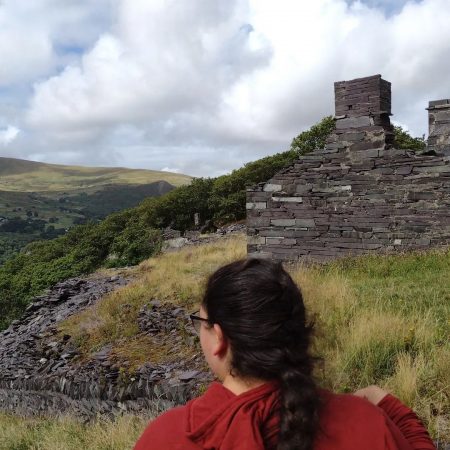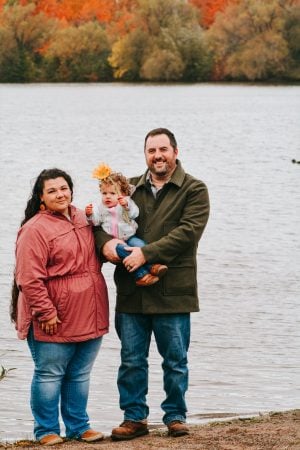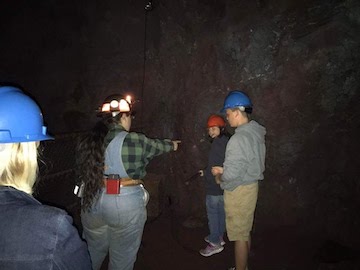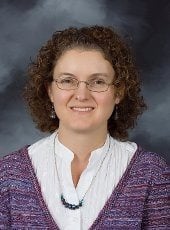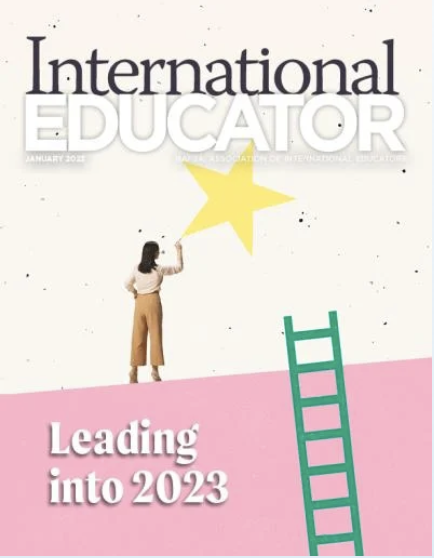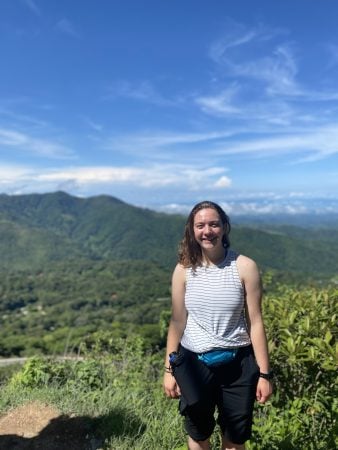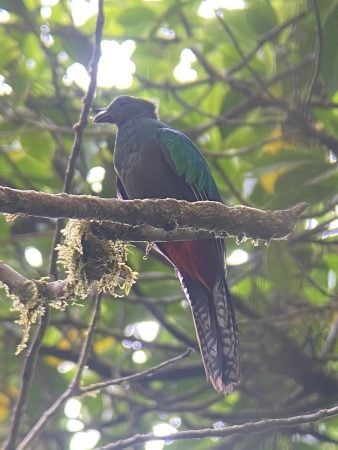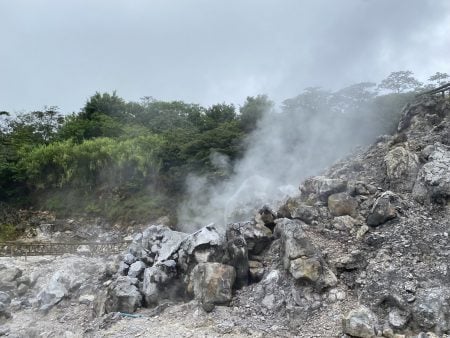Keweenaw Now recently published a blog post written by Kendra Lachik ‘23 (environmental engineering) about presentations given by Michigan Tech’s delegation to the COP27 climate conference, held in November of 2023 in Sharm El-Sheikh, Egypt. MTU students Anna Kavanaugh (environmental engineering, sustainability science and society), Rose Daily (environmental engineering) and Alexis Pascaris (environmental and energy policy) were quoted in the article about their experiences at the conferences.
Richelle Winkler, Professor of Sociology and Demography in the Social Sciences Department, will be a speaker at the 2023 Policy Summit in Cleveland, OH on Friday, June 23. Dr. Winkler and her colleagues will be discussing the implications of migration patterns in the moderated panel “Do Pandemic Population Shifts and the Increase in Remote Work Mean Opportunities for Small Cities and Rural Areas?”.
The event, hosted by the Federal Reserve Bank of Cleveland, is in it’s 16th year and will feature experts presenting on policies and programs affecting lower-income communities across the United States.
For more information on the 2023 Policy Summit, visit the event website.
Academic Year 2023-24
11/13/2023 – This Week in the Social Sciences 11/13/23
11/06/2023 – This Week in the Social Sciences 11/6/23
10/30/2023 – This Week in the Social Sciences 10/30/23
10/23/2023 – This Week in the Social Sciences 10/23/23
10/16/2023 – This Week in the Social Sciences 10/16/23
10/09/2023 – This Week in the Social Sciences 10/9/23
10/02/2023 – This Week in the Social Sciences 10/2/23
09/25/2023 – This Week in the Social Sciences 9/25/23
09/18/2023 – This Week in the Social Sciences 9/18/23
09/11/2023 – This Week in the Social Sciences 9/11/23
09/05/2023 – This Week in the Social Sciences 9/5/23
08/29/2023 – This Week in Social Sciences 8/28/23
Academic Year 2022-23
04/24/2023 – This Week in the Social Sciences 4/24/23
04/17/2023 – This Week in the Social Sciences 4/17/23
04/10/2023 – This Week in the Social Sciences 4/10/23
04/03/2023 – This Week in the Social Sciences 4/3/23
03/27/2023 – This Week in the Social Sciences 3/27/23
03/20/2023 – This Week in the Social Sciences 3/20/23
03/13/2023 – This Week in the Social Sciences 3/12/23
02/27/2023 – This Week in the Social Sciences 2/27/23
02/20/2023 – This Week in the Social Sciences 2/20/23
02/13/2023 – This Week in the Social Sciences 2/13/23
02/06/2023 – This Week in the Social Sciences 2/6/23
01/30/2023 – This Week in the Social Sciences 1/30/23
01/23/2023 – This Week in the Social Sciences 1/23/23
01/16/2023 – This Week in the Social Sciences 1/16/23
01/09/2023 – This Week in the Social Sciences 1/9/23
12/12/2022 – This Week in the Social Sciences 12/12/22
12/05/2022 – This Week in the Social Sciences 12/5/22
11/28/2022 – This Week in the Social Sciences 11/28/22
11/14/2022 – This Week in the Social Sciences 11/14/22
11/07/2022 – This Week in the Social Sciences 11/7/22
10/31/2022 – This Week in the Social Sciences 10/31
10/24/2022 – This Week in the Social Sciences 10/24/22
10/17/2022 – This Week in the Social Sciences 10/17
10/10/2022 – This Week in the Social Sciences
10/03/2022 – This Week in the Social Sciences
09/27/2022 – This Week in the Social Sciences
09/26/2022 – This Week in the Social Sciences
09/18/2022 – This Week in the Social Sciences!
09/13/2022 – First newsletter of the year!
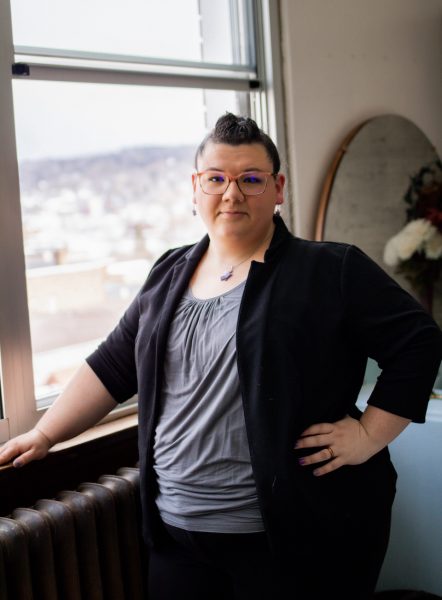
Can you complete a jigsaw puzzle without using all the pieces? Similarly, you cannot accurately complete the industrial heritage narrative of a place without incorporating the knowledge and voice of all actors. Each voice represents diverse perspectives, experiences, and contributions across a wide range of those who lived it. Each voice is a single piece in the jigsaw puzzle of that narrative. But the narrative is often recorded and written by those in positions of power and privilege. This leaves out the voices of underrepresented groups, including women, Indigenous people, and others who have faced discrimination and marginalization.
Often the challenge is how do you acquire narratives from underrepresented groups? Simply asking may not work. Individuals may have other priorities. They might be distrustful of historians like those who have misrepresented them in the past. They may be unresponsive to a stranger who has yet to build trust with them or their community.
Adding Indigenous and Descendant Voices to Industrial Heritage Narratives
Larissa Juip, Industrial Heritage and Archaeology PhD candidate is looking to change that. She is one of 45 2023 Mellon/The American Council of Learned Societies (Mellon/ACLS) Dissertation Innovation Fellowship recipients. Each fellow receives a $50,000 award, consisting of a $40,000 stipend for the fellowship year; $8,000 for project-related research, training, professional development, and travel expenses; and a $2,000 stipend to support external mentorship and advising that offers critical perspectives and expertise on the fellow’s project.
Mellon/ACLS Dissertation Innovation Fellowship awardees embark on innovative dissertation research projects. Larissa’s “Re-Storying an Industrial Landscape: Moving Beyond Traditional Approaches to Heritage Interpretation” project seeks to show Indigenous methodologies of storywork and photovoice can be used for traditional knowledge sharing to advance inclusive, equitable heritage interpretation practices with Indigenous and Descendant communities to produce an integrated model and framework for industrial heritage sites to co-create heritage interpretation. Larissa’s research will be guided by the Two Row Wampum Belt. It is a symbol of peace, equity, and respect that affirms the spirit and intent of a relationship.
This is among the highest honors a graduate student can receive.
“The American Council of Learned Societies is the preeminent organization that promotes American scholarship in the humanities and related social sciences,” said Don Lafreniere, chair of Michigan Technological University’s Social Sciences department. “Larissa is a rising leader in the field and this honor highlights the importance of her work and the quality of scholarship produced by students in Industrial Heritage and Archaeology.”
Larissa observed how industrial heritage sites in Minnesota’s ‘Iron Range’ often excluded Indigenous and Descendant community narratives detailing their relationships with iron mining. She will explore the following: What relationships do Indigenous and Descendant community members have with historic and contemporary iron mining in Minnesota’s ‘Iron Range,’ and how can industrial heritage sites co-create interpretation through inclusive, equitable engagement practices to tell these stories?
Making Industrial Heritage Narratives More Inclusive
The exclusion of narratives in heritage interpretation is neither a new problem nor rare.
“This research investigates the specific case of mining heritage in the Vermilion and Mesabi [Minneota mining region] and asks how heritage sites in these landscapes can be more inclusive of the multitude of existing narratives,” Larissa explains. “First, these narratives must be revealed: what relationships do Indigenous and Descendant community members have with iron mining (historic and contemporary) in Minnesota’s ‘Iron Range’? Second, relationships between heritage sites and communities must be formed: how can industrial heritage sites in Minnesota’s ‘Iron Range’ co-create heritage interpretation that tells these stories? Finally, an example of best practices must be developed to promote this co-creation: what does an integrated model and framework for inclusive, equitable engagement practices look like? By answering these three questions, this research works to understand how heritage sites can move beyond traditional approaches to heritage interpretation to present more inclusive and equitable site narratives.”
Larissa’s work is notable on many levels. “It is particularly impactful for a student at Michigan Tech to be recognized for their efforts by the American Council of Learned Societies,” said Will Cantrell, Associate Provost and Dean of the Graduate School at Michigan Tech. “This award, sponsored by the Mellon Foundation, is designed to foster scholars who can build a more diverse, inclusive, and equitable academy, and I am particularly pleased that Larissa has been recognized for this. It is a testament to her, to the guidance from her advisor, Dr. Baird, and to the support from her department, Social Sciences.”
Larissa’s project will go a long way to help others create more inclusive industrial heritage narratives. “Larissa is part of the new wave of engaged scholars in the academy that are creating new methodologies that create equitable and inclusive places,” said Melissa F. Baird, Associate Professor of Anthropology at Michigan Tech. “Her project centers on equitable histories – that is, restorying the industrial landscape histories of a historical mining region in Minnesota. Until now, most of these stories have focused on stories of men and might, histories of technological innovations, and the story of industry over the environment. Her work broadens these interpretations, recenters community experiences, and assesses how communities living and working in these regions understand and navigate these histories. She is truly extraordinary, and I feel honored to work with and learn from her.”
Q&A with Larissa Juip
We had a chance to sit down with Larissa, and delve deeper into the fellowship, her research, her plans for the future, and how she will help to complete the industrial heritage narrative puzzle.
Q: What does this fellowship mean to you? What will it help you to achieve?
Larissa: Receiving this fellowship means several things to me. As an Indigenous scholar, my approach to research often falls outside of the ‘norm’ for academia, so having my work recognized by Mellon/ACLS is huge in terms of validating my non-traditional approach to research. The fellowship also shows how timely and valuable my research is. Having this fellowship provides me with the opportunity to practice the kind of meaningful relationship-building that I had hoped to do by helping to extend my research timeline so that the communities I am engaged with do not feel rushed in the relationship and research process.
I feel very lucky to have received this fellowship. I also want to acknowledge the help and support from Drs. Melissa Baird, Angie Carter, and Valoree Gagnon for helping me write the proposal for this award, and my committee as a whole for helping me to frame my research and develop my unique approach over the last few years.
Q: Please tell me about your research? What is it about? What are you hoping to learn? How will society benefit?
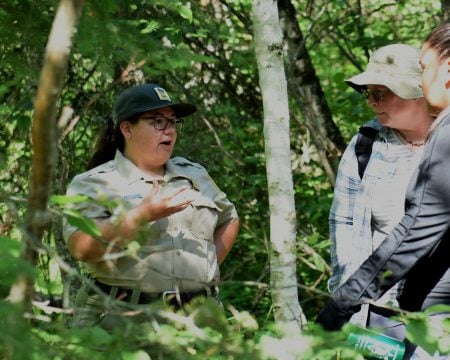
Larissa: My research is about uncovering hidden narratives from Indigenous and Descendant communities of Minnesota’s ‘Iron Range’ about iron mining (past, present, and future). Ultimately, I hope to collaboratively produce an example of best practices for engaging with these communities for improving the industrial heritage interpretation that is currently in existence, as well as future interpretive ventures. I believe this research is beneficial for several reasons. First and foremost, it works to uncover hidden narratives that have been excluded from heritage interpretation; this exclusion further dispossesses Indigenous and Descendant communities. Second, it promotes more holistic heritage interpretation that promotes diversity and truth-telling at heritage sites. Finally, the example of best practices has the potential to be used by other systematically marginalized communities with relationships to industry to share their own narratives at industrial heritage sites.
Q: The Mellon/ACLS Dissertation Innovation Fellowship program is designed to support emerging scholars as they pursue bold and innovative research in the humanities and interpretive social sciences. What is bold about your research?
Larissa: I believe that the ‘bold’ part of my research is threefold. First, my research is built on the framework of the Two Row Wampum Paradigm, a research framework and methodology that centers relationships, promotes intergenerational learning and sharing, flattens power dynamics between researchers and community members by elevating community members to co-researcher, and recognizes that researchers and communities can engage in research together with different goals and not be in conflict.
Second, the combined methods of Indigenous storywork and photovoice bridge traditional methods of knowledge sharing through storytelling with the physical remains of industry on the landscape, creating space for stories that coexist alongside ruins in a way that is currently not present in industrial heritage sites in my research area. Finally, I am promoting a culturally competent informed consent process by using tobacco as a traditional method of asking co-researchers to share their knowledge and the creation of a wampum belt as a method of obtaining and recording informed consent, as well as a traditional method of recording my research.
Q: The Mellon/ACLS Dissertation Innovation Fellowship program funds “research projects cultivating greater openness to new sources of knowledge, innovation in scholarly communication, and, above all, responsiveness to the interests and histories of people of color and other historically marginalized communities, including (but not limited to) Black/African American, Hispanic/Latinx, and Indigenous communities from around the world; people with disabilities; queer, trans, and gender nonconforming people; and people of diverse socioeconomic backgrounds.” How does your research fit into that narrative?
Larissa: My research not only centers Indigenous research paradigms and methods, but it also centers the voices of Indigenous and Descendant communities in industrial heritage landscapes where they are frequently excluded. Typically, the narrative about industry and Indigenous Peoples presents these communities as ‘victims’ of industry, removed from their homelands or worse. The reality is that in many cases, Indigenous Peoples not only continued to live in areas where industrial activity was happening, but they often were participants in that activity in various ways; this narrative is in direct conflict with the idea that all Indigenous Peoples are environmentalists who are opposed to all forms of industry, a narrative that dispossesses both historic and contemporary populations that have a more complex relationship with industrial activities like mining.
Q: What do you hope to do once you receive your PhD?
Larissa: I am very passionate about being an educator. I have served in a variety of formal and informal education roles previously, from licensed teacher to naturalist to heritage interpreter to environmental education lesson writer. I think there are a lot of things I can do with a PhD, but my goal is ultimately to be able to continue to serve the communities that I work with through my capacity as an educator, especially in higher education. I think that serving as an educator in this capacity provides me with the opportunity to help inform the next generation of researchers, heritage practitioners, and community leaders to address some of the gaps in our current approaches to heritage interpretation.
Q: Why did you choose to study here at Michigan Tech?
Larissa: Michigan Tech was actually on my radar when I pursued my master’s degree, and I may have chosen it if I had a connection at that point in my life to industrial heritage, but that was several years down the road. I chose Michigan Tech because I worked as an interpretive mine guide at the Soudan Underground Mine in northeastern Minnesota for several years. In this position, I built relationships with community members on the Iron Range and developed a passion for industrial heritage, but I also saw gaps in the site’s heritage interpretation that many of my non-Indigenous colleagues did not. Michigan Tech’s program was a good fit for me to propose a research project that could work towards addressing those gaps by working with faculty with a variety of research and work experiences, including work with Indigenous communities.
Q: What do you like the most about Michigan Tech?
Larissa: Am I allowed to say that my favorite thing about Michigan Tech is the location? When I lived in Soudan previously, the community feel was something that I appreciated so much, and we’ve (my family and I) been able to experience that living in Calumet. It’s not something you can easily find in a major city. The presence of the industrial heritage on the landscape is also something I really appreciate because students in our department are able to engage with industrial heritage literally in their backyards, it’s not something abstract or far away.
Q: What piece of advice would you give to a fellow graduate student looking to acquire a Mellon/ACLS Dissertation Innovation Fellowship?
Larissa: I see a lot of graduate students kind of get ‘talked out’ of doing their research in novel ways because the faculty they work with are unfamiliar with it. Most of my committee was unfamiliar with my approach, too. So I guess my advice to other graduate students who would consider applying for this fellowship is to stand strong in the approach you want to take, which often means exerting extra effort to explain it to those around you so they have the opportunity to understand it for themselves and see the value in what you are doing. Don’t be afraid to include yourself in your research!
Q: What would you say to students interested in studying industrial heritage?
Larissa: I would tell students that are interested in studying industrial heritage to spend some time as a heritage interpreter! Especially if they live in the area, there are so many opportunities to have summer employment at an industrial heritage site, and you’ll learn a lot about industrial heritage that you can’t really learn in the classroom.
Q: What is your dream job?
Larissa: I have several dream jobs actually, and they’re pretty tied for which I would prefer. I would love to be able to travel to different communities, all over, and help them have their stories included in industrial heritage interpretation. I would also really love to establish a Great Lakes industrial heritage consortium for industrial heritage practitioners, professionals, and students to be able to share resources and gain access to heritage interpretation training, as a space for these groups to collaborate with each other, and as an organization that could offer consulting services to help industrial heritage sites in the region meet their site-specific needs and goals for interpretation.
And I would love to find a faculty position at a university, ideally somewhere around Lake Superior. Faculty at Tech would probably be my top choice, simply because of the relationships we’ve formed and the community we’ve built. I think there’s a lot of potential here for building out an Indigenous Studies program on campus that not only offers courses, but also engages with the wider community about Indigenous topics, supports current and incoming Indigenous students by creating a community for them, and forming stronger relationships with Keweenaw Bay and Lac Vieux Desert to encourage more students from those communities to choose Tech for their education needs so they can stay closer to home.
Check out the latest happenings in the Department of Social Sciences via our weekly newsletter.
Looking for past issues? Check out our Newsletter Archive here.
Check out the latest happenings in the Department of Social Sciences via our weekly newsletter.
Looking for past issues? Check out our Newsletter Archive here.
Check out the latest happenings in the Department of Social Sciences via our weekly newsletter.
Looking for past issues? Check out our Newsletter Archive here.
Kari Henquinet is quoted multiple times by International Educator Magazine in the story “Leading from the Middle” in its January 2023 issue. Henquinet shares her experiences leading and advocating for international education programs in higher education in the story, which discussed effective strategies for mid-level leaders in higher ed. Mid-level staff can be effective leaders—even when they lack official authority or decision-making power.
Among her quotes:
Kari recommends that middle managers “try to cultivate relationships with influential people in your institution—people who have the ear of the upper administration or get to sit at the table for decisions that are made,” she says. “Pay attention to new initiatives, strategic plans, trends in higher education, so that you can get involved and support these on your campus in a way that positively impacts international education.”
When asked about mid-level managers, Kari says, ““These are people who have a measure of humility and listen for new perspectives and information. They will step up to do the hard work of researching and proposing ideas that are based on sound policies, facilitate complex conversations, and get buy-in or constructive criticism through each step of the process.”
They “communicate their work and results clearly and widely to draw attention to their contributions,” Henquinet said. “There is often a lot of good work that goes unnoticed in international education. The more a leader can make this work a point of pride and prestige for their institution, the better the chances are for more support and recognition.”
On what motivates her to be a leader: “It is usually the students who ultimately give me that motivation to be a leader,” says Henquinet. “I want them to have the opportunities to develop diverse relationships, find support networks while in a new place, build confidence speaking a second or third language, and know the power of experiential learning through study abroad, research and professional experiences.”
Michigan Tech’s Department of Social Sciences offers bachelor of science degrees in Anthropology, Policy and Community Development, Sustainability Science and Society, and Social Science, along with a bachelor of arts degree in History. Our graduate program includes masters and doctoral degrees in Environmental and Energy Policy and Industrial Heritage and Architecture (the only one of its kind in the world), and a masters in Sustainable Communities. Plus, you can get a graduate certificate in Public Policy in by taking three courses in just one term.
Questions? Contact us at socialsciences@mtu.edu. And follow us on Facebook, Instagram and Twitter for the latest happenings.
Dr. Angie Carter and her co-author Dr. Rebecca Christoffel have published “Supporting Women Landowners in Wetland Conservation” in Society & Natural Resources. The article analyzes data from a state-wide survey in Iowa and finds that a lack of experience with and misinformation about wetlands, coupled with a lack of access to needed conservation knowledge networks, limits conservation action for women landowners, no matter their age cohort.
Melia Austin immerses herself in her learning. One example: is a trip to Costa Rica during the summer of 2022 with fellow Michigan Tech students interested in sustainability. Building on what they learned at Michigan Tech, they observed what Costa Rica has done to become more sustainable in terms of environment, ecology, water treatment, and more. Plus, Melia immersed herself in the Costa Rican community, where she practiced her Spanish and earned credits toward her minor in Spanish.
Melia said, “I wanted to use what I’ve learned in my Spanish classes to grow in my understanding of the world, and learn about sustainability inside and outside of the classroom.” Day trips around Costa Rica greatly enhanced her learning.
Immersed in Sustainability
The day trips brought sustainability to life. A visit to a natural hot spring showed how Costa Ricans benefit from this sustainable form of energy. They also hiked through a sustainable forest where they saw a quetzal. This is a rare bird found in Costa Rica. Sustainable forests give species like the quetzal places to thrive. The forest was not only environmentally sustainable, but also socially, and economically sustainable. As a result, Costa Rica is able to identify and manage the impacts of businesses and people on the environment and adjust accordingly to be sustainable. She noted that the rainforest and its management met the criteria of the three pillars of sustainability that they learned about in their classes.
There were lots Melia enjoyed during her time in Costa Rica. Melia’s favorite thing was “attending a conference about sustainability with graduate students and professors from different universities.” She was able to diversify her learning about sustainability by connecting with others from different universities. This enhanced her experience as she immersed herself in new opportunities to learn about sustainability.
Study Abroad Takeaways From Melia
When asked what advice she would give to students considering studying abroad she said, “You are at a unique point in your life where you have the freedom and autonomy to travel and learn new things that might change how you see the world. It might even change your future plans.” In Costa Rica, she learned to be independent and travel independently. She is applying those learnings in a gap year in Senegal where she volunteers on a hospital ship. Immersing herself in Senegalese culture and the hospital environment, her goal is to gauge her interest in a career in medicine.
Learn about Melia and the other Michigan Tech students’ experiences in Costa Rica on the Costa Rica blog. Michigan Tech offers a number of study-abroad options in Costa Rica, Cumbria, Mexico, and Wales.

